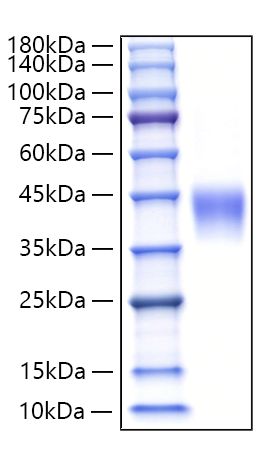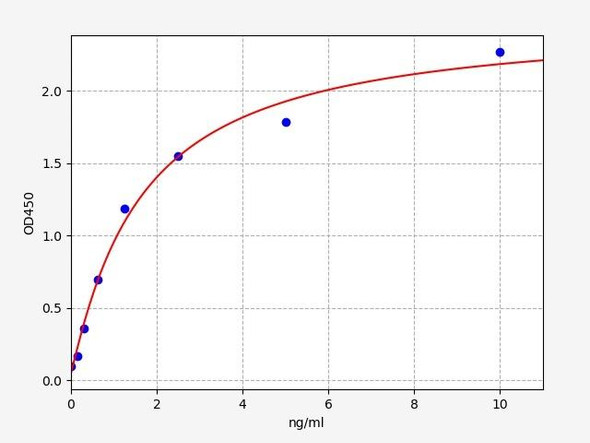Description
Recombinant Human Lutropin beta chain/LHB Protein
The Recombinant Human Lutropin beta chain/LHB Protein is a biologically active recombinant protein that plays a significant role in various cellular processes and signaling pathways in human biology. This protein is widely employed in immunological research, cell biology studies, protein-protein interaction analyses, and therapeutic development, providing researchers with a reliable tool for investigating Lutropin beta chain/LHB function and its implications in health and disease.
This product (SKU: RPCB1269) is produced using advanced expression systems and features a C-His tag for convenient detection and purification. The protein exhibits a calculated molecular weight of 14.04 kDa with an observed molecular weight of 35-45 kDa under denaturing conditions, achieving ≥ 95 % as determined by SDS-PAGE., ensuring exceptional quality and consistency for research applications.
Key Features
| High Purity by Affinity Chromatography | |
| Mammalian & Bacterial Expression Systems | |
| High lot-to-lot consistency via strict QC |
| Product Name: | Recombinant Human Lutropin beta chain/LHB Protein |
| SKU: | RPCB1269 |
| Size: | 10 μg , 20 μg , 50 μg , 100 μg |
| Reactivity: | Human |
| Synonyms: | LHB, Lutropin subunit beta, Lutropin beta chain, Luteinizing hormone subunit beta, LH-B, LSH-B, LSH-beta |
| Tag: | C-His |
| Calculated MW: | 14.04 kDa |
| Observed MW: | 35-45 kDa |
| Gene ID: | 3972 |
| Protein Description: | High quality, high purity and low endotoxin recombinant Recombinant Human Lutropin beta chain/LHB Protein (RPCB1269), tested reactivity in HEK293 cells and has been validated in SDS-PAGE.100% guaranteed. |
| Endotoxin: | < 0.1 EU/μg of the protein by LAL method. |
| Purity: | ≥ 95 % as determined by SDS-PAGE. |
| Formulation: | Lyophilized from 0.22 μm filtered solution in PBS (pH 7.4). Normally 8% trehalose is added as protectant before lyophilization. |
| Reconstitution: | Centrifuge the vial before opening. Reconstitute to a concentration of 0.1-0.5 mg/mL in sterile distilled water. Avoid vortex or vigorously pipetting the protein. For long term storage, it is recommended to add a carrier protein or stablizer (e.g. 0.1% BSA, 5% HSA, 10% FBS or 5% Trehalose), and aliquot the reconstituted protein solution to minimize free-thaw cycles. |
| Storage: | Store at -20℃.Store the lyophilized protein at -20℃ to -80 ℃ up to 1 year from the date of receipt. After reconstitution, the protein solution is stable at -20℃ for 3 months, at 2-8℃ for up to 1 week. |
LHB,Promotes spermatogenesis and ovulation by stimulating the testes and ovaries to synthesize steroids.Luteinizing Hormone (LH) is a 42 kDa heterodimer belonging to the glycoprotein hormone family. It is composed of noncovalently linked glycosylated alpha and beta chains. The alpha subunit (CG alpha ) is also a component of Follicle-Stimulating Hormone (FSH), Thyroid-Stimulating Hormone, and Chorionic Gonadotropin. The unique beta subunit confers the protein’s specific biological action and is responsible for the interaction with its receptor. The approximately 20 kDa human CG alpha subunit shares 73% and 72% amino acid (aa) sequence identity with the mouse and rat orthologs, respectively. The approximately 18 kDa human LH beta subunit shares 71% and 72% aa sequence identity with the mouse and rat orthologs, respectively. Multiple isoforms of LH exist due to differences in the post-translational glycosylation, sialylation, and sulphation modifications of its subunits. The composition, longevity, and activity of the different LH isoforms vary throughout a woman’s menstrual cycle and reproductive life cycle. LH is produced and secreted by the anterior pituitary gland. Its secretion is controlled by Gonadotropin-Releasing Hormone from the hypothalamus; however, LH secretion can also be stimulated by estradiol. LH works in concert with FSH to regulate female reproduction; FSH stimulates follicular growth and LH induces ovulation. LH alo drives formation of the corpus luteum by promoting progesterone production. Additionally, LH has been suggested to stimulate the adrenal gland in postmenopausal women to induce secretion of sulfated DHEA, a precursor to androgens. In the testis, LH induces Leydig cell production of testosterone. Hypersecretion of LH has been shown to occur in women with polycystic ovary syndrome and is associated with an increased risk of infertility and miscarriage. Additionally, increased serum LH levels are associated with decreased cognition and have been implicated in the development and progression of Alzheimer’s disease.







